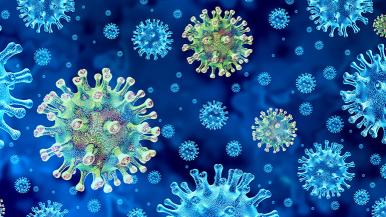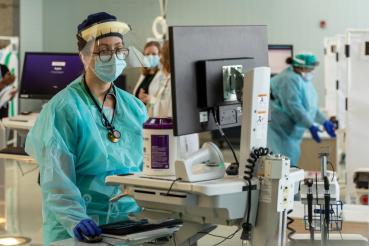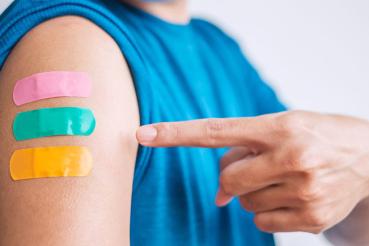With the emergence of the new SARS-CoV-2 omicron variant that causes COVID-19, you may have wondered why the coronavirus keeps mutating.
According to John Segreti, MD, an infectious disease specialist and medical director of infection control and prevention at Rush University Medical Center, there’s a simple answer: “That’s just what viruses do.”
How variants happen
Segreti explains that whenever any type of virus infects a person, an error can occur when the virus replicates that alters its genetic code. This code includes instructions that the virus needs to reproduce. Some mistakes in the genetic code make it impossible for the virus to replicate, so it cannot thrive. But other mistakes can make the virus more equipped to survive, he says. This leads to variants like the SARS-CoV-2 delta variant, which is currently responsible for the vast majority of COVID-19 cases in Illinois.
The latest variant called omicron, which was first detected in South Africa and is now in the United States, is proof that viruses are always changing. And the more people that are infected with the coronavirus, the more replication there will be, creating the potential for more mutations that lead to new variants of the virus.
“If we want to slow down the number of variants, we need to slow down the number of people getting infected,” Segreti says.
Omicron won’t be the last
The World Health Organization names SARS-CoV-2 variants of concern and interest after Greek letters. Omicron, which represents the 15th letter in the Greek alphabet, certainly won’t be the last coronavirus variant. Segreti expects we will far exceed the capacity of the ancient alphabet, which has 24 letters.
“Multiply the hundreds of millions of people being infected with the trillions of viruses in every person, and you have a huge number of potential mutations that can be made,” he says.
Tired of new variants? Get vaccinated
The best protection against the delta and omicron variants is getting vaccinated or getting a booster if you are due, Segreti says. If you are an adult, the Centers for Disease Control and Prevention says you should get a Pfizer or Moderna booster if it has been at least six months since you completed your primary two-dose series with the Pfizer or Moderna vaccines. If you had a single-dose Johnson & Johnson shot at least two months ago, the CDC says you should get a booster with any of the COVID-19 vaccines available.
The CDC also now recommends boosters of the Pfizer-BioNTech vaccine for those ages 16 and 17 if it has been at least six months since their initial Pfizer vaccination series.
Other protective steps for everyone include wearing masks, practicing social distancing and staying home if you are sick.
Need a COVID-19 vaccine or a booster? You can schedule an appointment to receive one now at our vaccine clinics.




